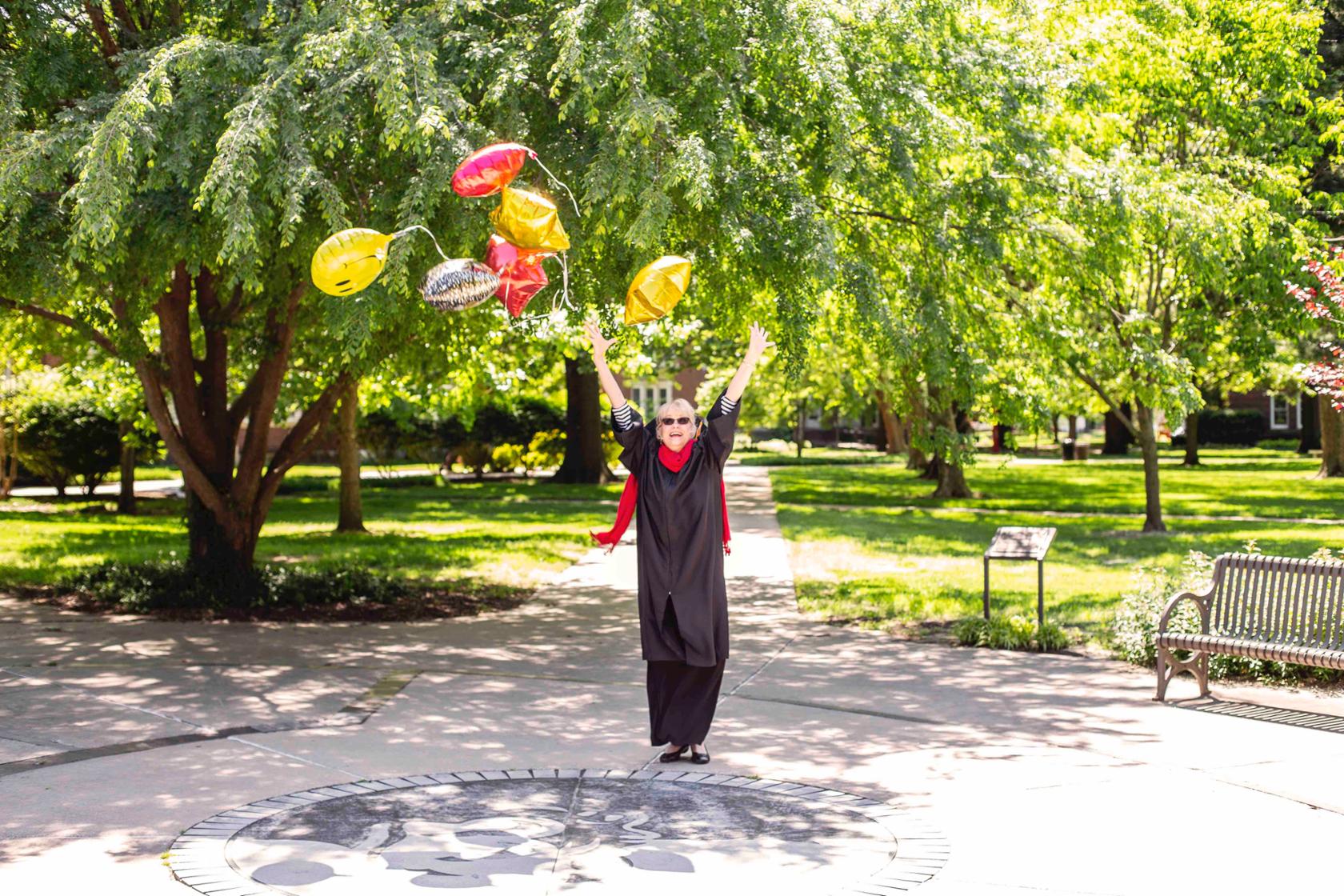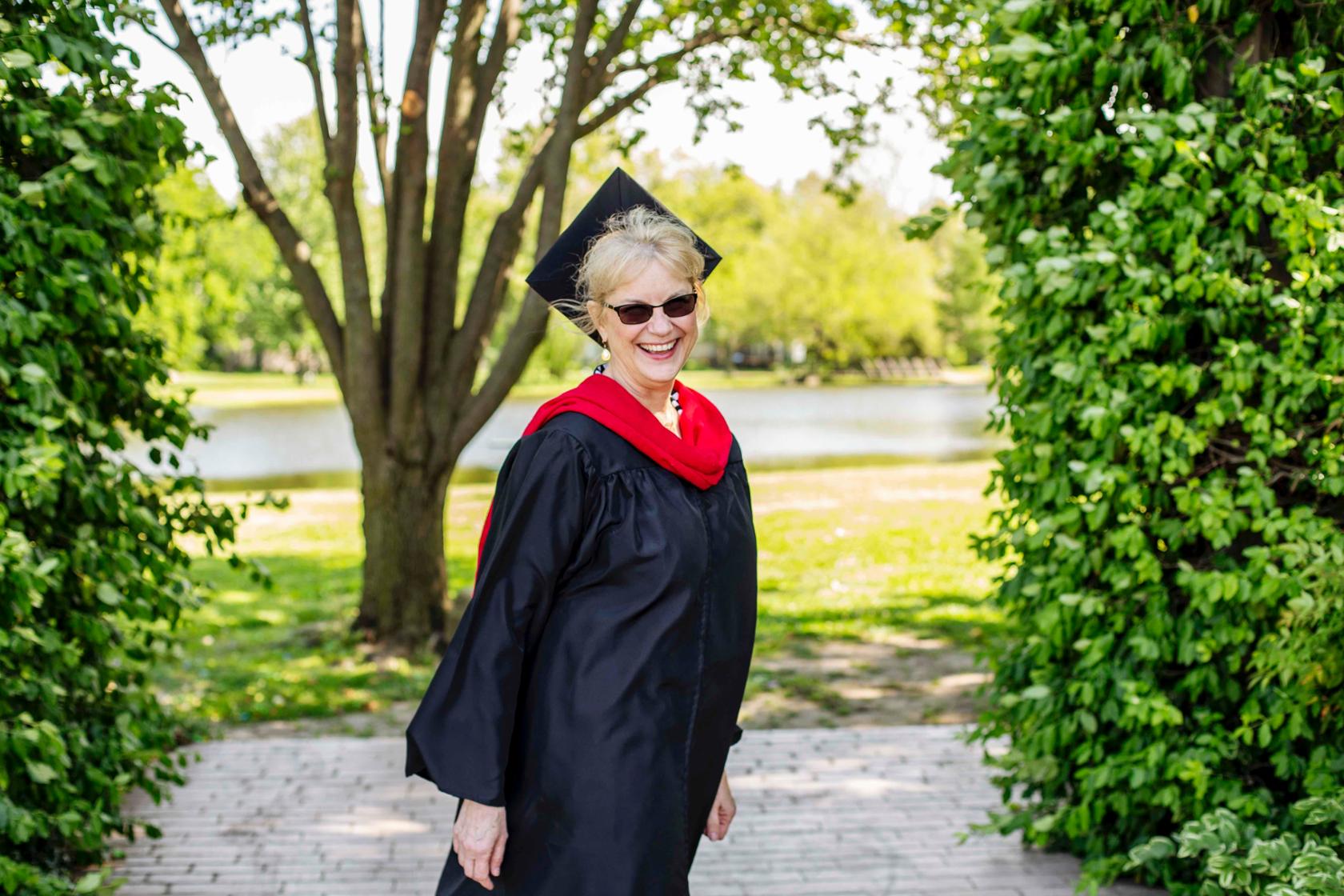Student to earn degree after 15 years
Monday, May 11, 2020 8:30 AM
Milestones, People and Society, Academics, News
Pittsburg, KS

On Sunday afternoon, Jeannice Parker, 66, put on a borrowed cap, gown, cords, and tassel, and posed on the Pittsburg State University campus for graduation photos that were 15 years in the making.
She rang the Centennial Bell, per longstanding tradition, and despite not having a commencement ceremony to walk in the following week, she was proud and happy, she said.
“I personally have been through some excruciatingly tough times in 22 years, but I don't focus on the negative – I focus on the positive,” said Parker with a smile. “Going to college has been one of the best choices I ever made.”
She wouldn’t have thought so in 2005, not long after beginning a job as an administrative associate in the Office of Career Services at Pittsburg State, when her boss at the time encouraged her to take a class.
“I said no thanks, I don’t think so,” Parker recalled. “But she insisted. She wanted me to experience what students experience.”
Parker was 51. She was responsible for helping students become prepared for the professional world by offering them guidance with resumés and cover letters. That, she could do; she’d been a professional for years.
But Parker, who left home in her teens in order to survive, had never attended college.
“My boss insisted, and so I finally said OK,” she said. “I enrolled in psychology.”
That psychology class turned into a 15-year pursuit of a bachelor’s degree, and on May 15 when the semester officially ends at PSU and Parker completes her last seven hours of classes, she'll have earned her bachelor’s in general studies. To date, she has a 3.871 GPA.
“I’ll be the first one in any generation in my family tree to have a degree,” she said.
But equally important, she said, is that the experience has indeed given her the insight that her boss had hoped it might.
“One of the most important things I’ve gained in 15 years is a connection to the changing generations of students, because I’ve been in the classroom with them,” she said. “I’ve absolutely loved the time with students.”
"Non-traditional"
In addition to having taken classes as often as they fit into her work schedule, Parker also is a pastor’s wife, which means plenty of obligations in her personal life. She and her husband of 41 years have served the congregation of the non-denominational Cornerstone Family Church for 20 years, with Parker leading the children’s ministry.
Each summer for 21 years, she was the director of Adventure Camp for more than 100 children, and has assisted with providing food to the homeless, held sewing classes, and aided those in need. She’s gone on mission trips to 13 countries abroad. She’s also a grandmother, and over the years has been a host to 18 international students who have lived at the couple’s home.
Through it all, she said, it’s given her a better grasp of what a non-traditional student really is.
“It’s not just a 66-year-old woman,” she said. “Statistics show that actually, 49 to 53 percent of the population is academically considered non-traditional. You might have an 18-year-old who has a child. That’s non-traditional. There are a wide range of things that make someone academically non-traditional, and that’s important for people to realize.”
As a member of this year’s PSU Leadership class, she encouraged her group to make the challenges of non-traditional students the focus of their project.
“If you are aware of and understand their needs, that can be really valuable for both student success and university retention,” she said. “It was informative to have a panel of diverse non-traditional students tell their stories and communicate their challenges.”
No matter how busy she is, she said, she always looks forward to class — especially those in art.
“I took a clay class early on to satisfy an art requirement, and I noticed in it that peoples’ shoulders drop as they work with the clay, they relax and become grounded. There’s a peace about it,” she said.
She found herself intermittently adding art classes in between her general education requirements, and Professor Portico Bowman encouraged her to pursue it as a minor.
“I considered combining art and counseling, and I would love to have a master’s degree and be able to teach,” she said. “But I’m 66, and there is a great generation of young teachers coming out of Pitt State who will be snapped up by schools, so I have to be realistic when it comes to getting hired.”

What's next?
Many times in the past year, friends and co-workers have asked “What’s next?”
It’s difficult to answer.
“I’m a lifetime learner, and a lifetime server,” she said. “I felt called to serve the next generations, and the job that I’m in is one I absolutely love. How can you leave something that fulfills every ounce of your being? The people I work with, the students I associate with, the versatility of it all, and learning new things every day.”
“Rarely do people get to live the life I’ve lived, with a husband who loves and adores me, and get to be everything they want to be,” she said. “I feel as if this higher education has helped me become the person I was meant to be.”
One thing of which she’s sure: she’s not quite done learning. She’s looking at the fall schedule of courses with interest.
“I’m going to rest this summer, and then I think I’m going to continue as a graduate student,” she said.
“To find out who you are, to get through the layers, and then to embrace who you are and different ways to serve people, has made my life so broad, so vast, that I’m very fortunate,” she said. “If I could have hugged Dr. Scott at the ceremony out of gratitude to the university and my teachers – I know it’s probably not proper, but I would have done it.”